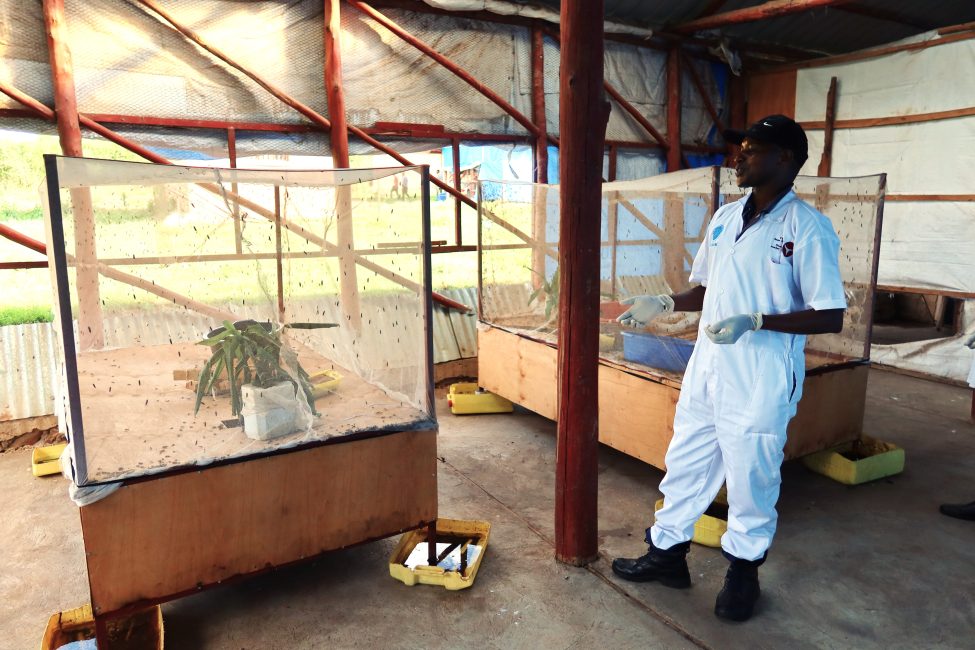In recent years, our teams in Rwanda have opened up the way to innovation, developing projects that combine creativity and practicality. These initiatives range from the use of insects to convert waste into nutritious feed for livestock to the use of drones to deliver high-quality semen and thus improve pig keeping, even in the most inaccessible areas. Such promising projects have the potential to improve the lives of many rural communities in Rwanda.
Sustainable livestock keeping thanks to fly larvae
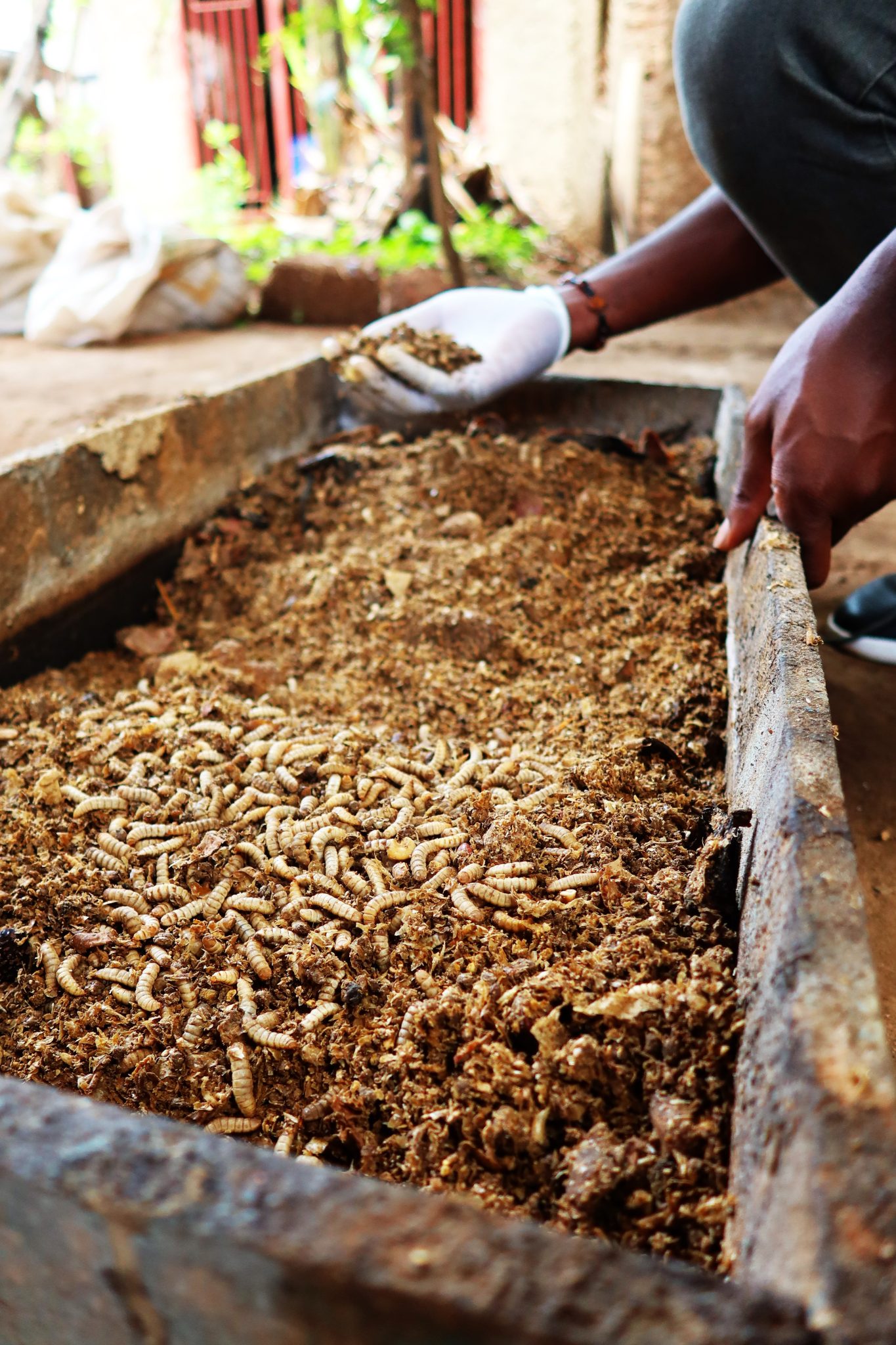
The larvae feed on organic waste, often a mixture of dung and kitchen waste.
According to the United Nations, rapid population growth in Africa will mean that demand for meat, milk and eggs on the continent will almost quadruple by 2050. As Rwanda is particularly affected by this, it has decided to invest in the expansion of its meat production industry. The country’s pig stocks have almost doubled over the past five years. However, this rapid expansion has brought its share of challenges, the most urgent of which is surely the shortage of feed for these animals, linked to a lack of arable land. In fact, Rwanda imports almost 90% of the feed intended for its livestock. This poses a threat to both its food sovereignty and to the environment. A large proportion of the soy imported for this purpose is produced on deforested land, while fish meal is a cause of immense loss of marine biodiversity.
To fight this problem, we have launched a pilot project to breed black soldier fly larvae. Rich in protein, these larvae are an ideal ingredient to replace fish meal and soy. With a production unit of just a few square metres, the 240 small livestock keepers benefiting from the scheme can feed the equivalent of ten pigs or a hundred chickens. Bred under nets, the flies hatch out their larvae that are fed on a mixture of dung and kitchen waste. After just 14 days, the larvae are fully developed and ready to be harvested, dried and added to the animals’ feed rations. The rest of the substrate can then be used as a natural fertiliser that is very effective on crops.
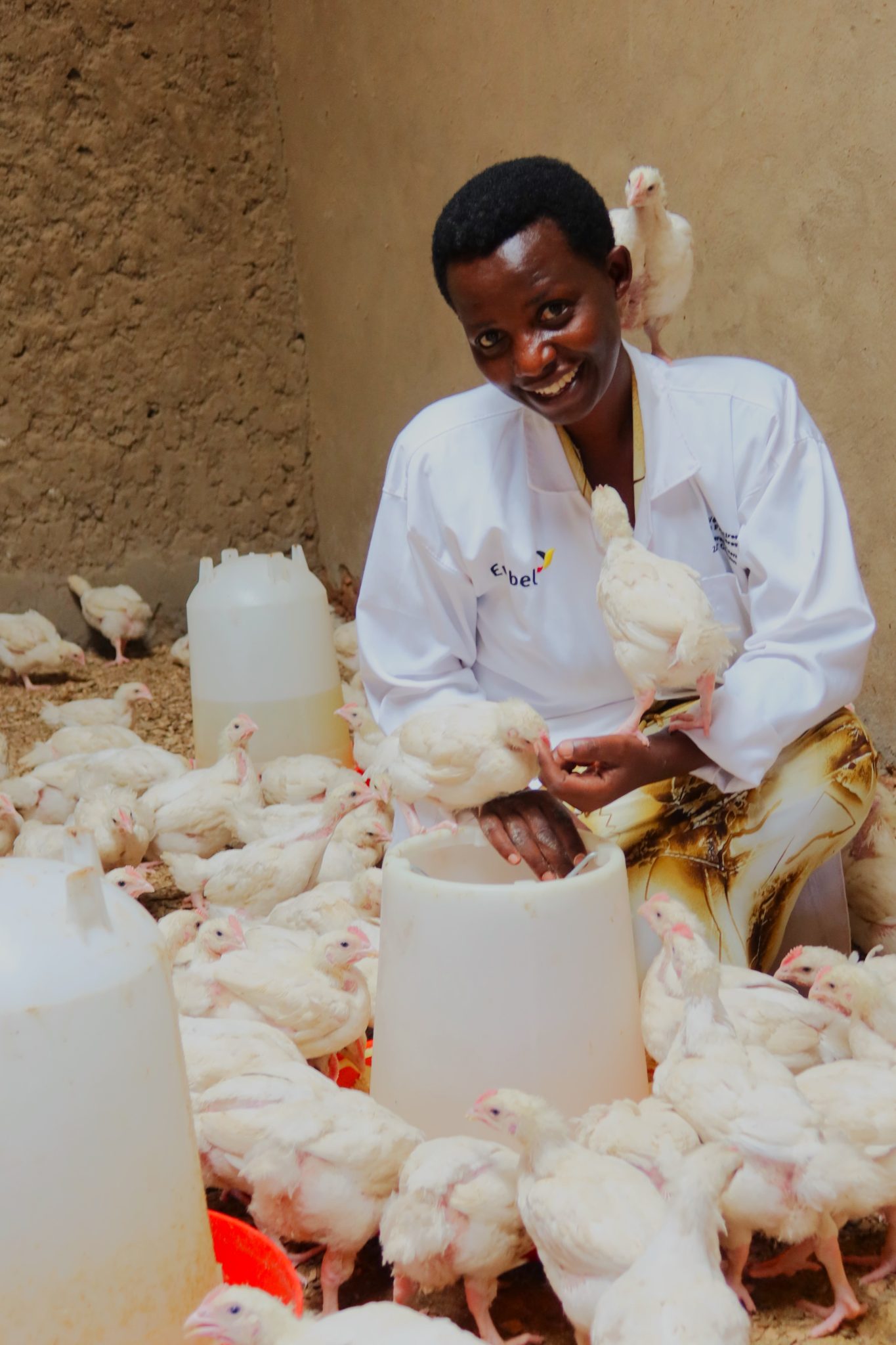
Janvière Twizeyemungu (aged 45) is absolutely convinced of the benefits of breeding black soldier flies. This innovation has enabled her to reduce the costs of feeding her chickens by 30%, thus increasing her profit margin per chicken to 70%.
This innovation has proved popular among the livestock keepers for its impact that is both environmental and economic. The work done in partnership with Ghent University has demonstrated that the use of black soldier fly larvae permits livestock keepers to reduce their animal feed costs by up to 30% with no loss of quality. As it happens, poultry feed supplemented with larvae offers nutritional benefits equivalent to those of commercial feed, specifically those based on soy. In some respects, the dried larvae perform even better! In close collaboration with the University of Rwanda and Belgian universities, we are continuing to explore ways of improving this promising technology.
Drones to facilitate the artificial insemination of pigs
For several years, the Rwandan government has been stimulating the pork industry by optimising reproduction techniques. Specifically, the State has set up six artificial insemination centres around the country where livestock keepers can obtain reduced-price semen. However, these centres remain difficult to access for people in remote areas. Many livestock keepers have to take difficult routes to get there, sometimes needing to cross mountains. The return journey can take up to six hours, which deters a fair number of them. To respond to this difficulty, we have developed an innovative project with the delivery company Zipline, in partnership with the Rwanda Agriculture Board. The latter has equipped two distribution centres with an automated drone delivery service.
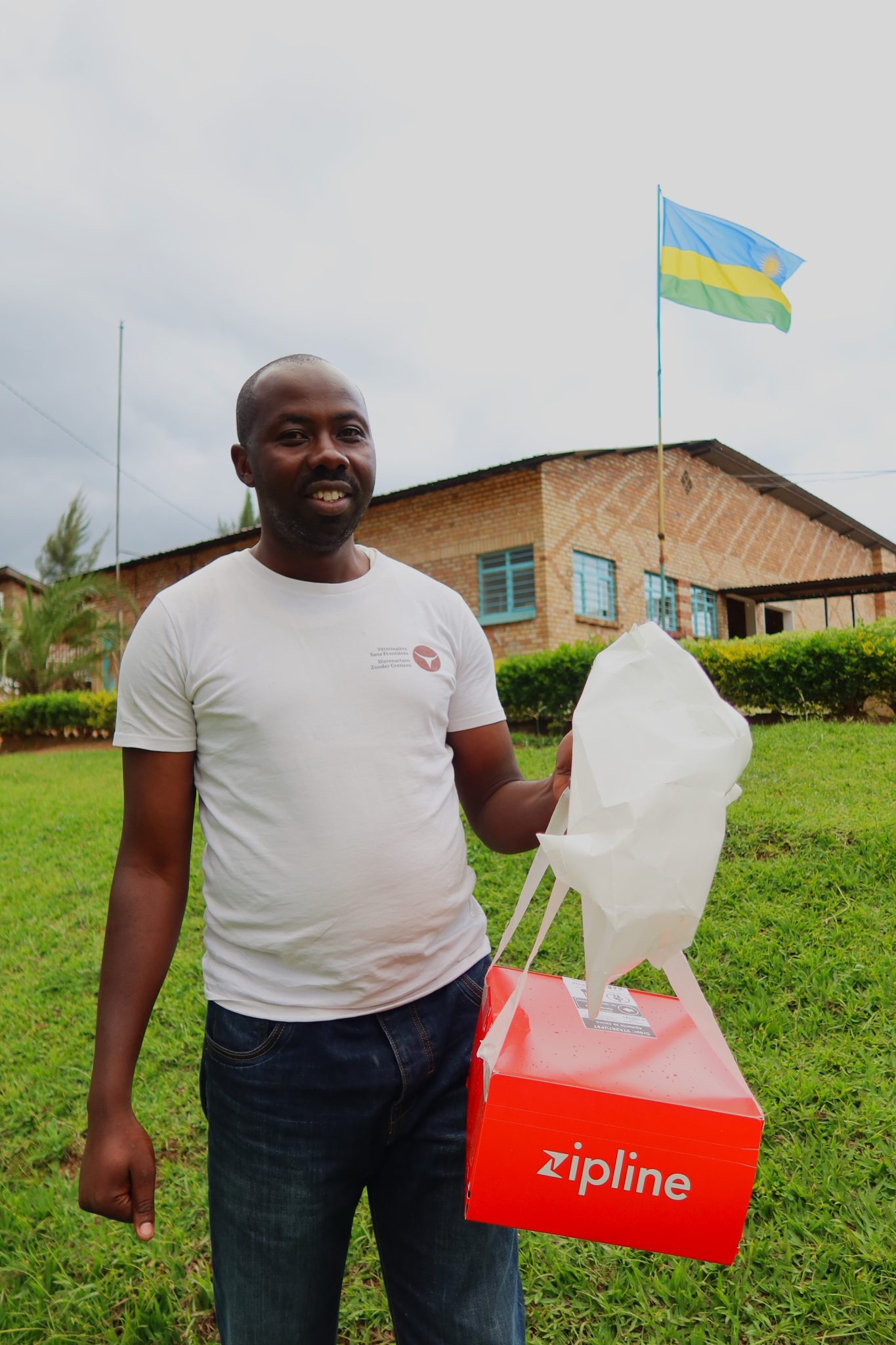
Viateur Bamporineza is among the 84 vets whom we have trained in the artificial insemination of pigs in Rwanda. Thanks to the drone delivery service, Viateur has been able to inseminate more than 500 pigs in 2023.
This system facilitates supplies by providing rapid, secure access to semen for inseminating pigs. No more long, expensive trips to the centre! The drones deliver free insemination kits in less than 45 minutes. This means a vet can order semen and inseminate a sow within a few hours. This practice has various advantages: besides reducing the risk of disease transmission during mating, the use of exotic semen makes it possible to diversify the gene pool and improve the profitability and resilience of the pigs.
Between July and December 2022, 9,404 insemination kits were delivered to every corner of the country. With an 85% insemination success rate, the system has already brought more than 79,934 piglets into the world. So it is actively contributing to the improvement of pig production in Rwanda. Besides artificial insemination, the drones can also be used for other purposes linked to animal or human health. To deliver vaccines to contain future epidemics, for example. In fact, 70,000 vaccines were delivered by drones in 2022 to fight an outbreak of Rift Valley fever in Nyagatare district.
Cow dung for cooking
In 2022, 93% of the Rwandan population were still cooking on wood or charcoal fires. Besides contributing to the systematic deforestation of hillsides, this practice releases smoke that can cause eye problems and respiratory diseases. Faced with this problem, the government initiated the National Domestic Biogas Programme in 2007 to promote the installation of biodigesters among small livestock keepers who keep dairy cattle. This technology makes it possible to ferment the dung of their cattle in a digestion process that produces methane gas and connects it to the kitchen. The use of this biogas for cooking improves hygiene in the home. It also helps women and children save precious time, since they are usually the ones responsible for gathering wood and preparing meals. Furthermore, the fermentation process transforms the excrement into a high-quality fertiliser for crops (the digestate), which improves agricultural yields.
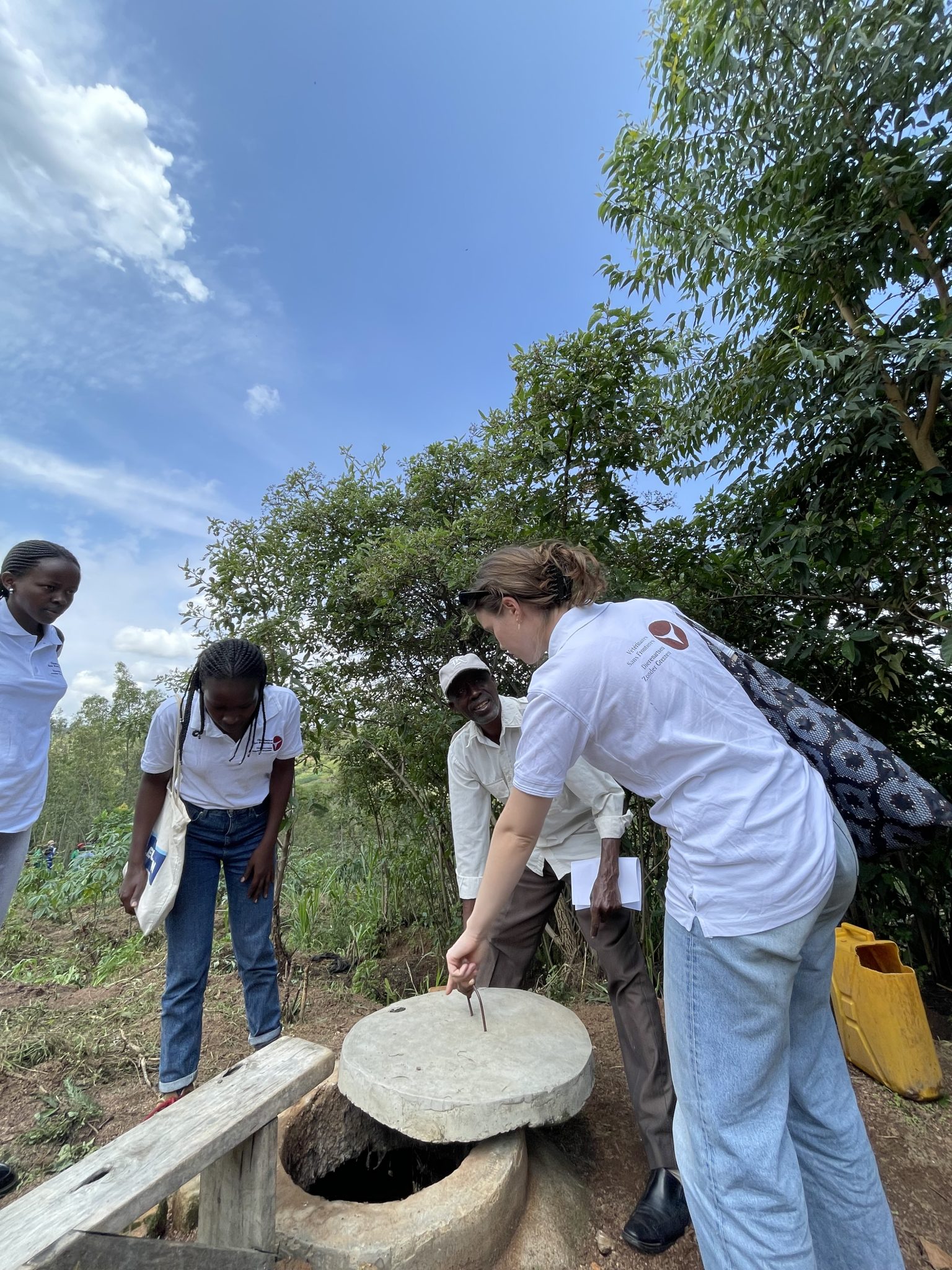
Eva and Catherine conducted research on biogas in 2022 as part of their master’s thesis.
From 2014 to 2020, Vétérinaires Sans Frontières Belgium and its local partner IMBARAGA contributed to the Rwandan programme by developing a project based on green energy and livestock keeping in the Southern Province. Our team coordinated the installation of 650 biodigesters and the repair of 173 old systems. Over time, the project has improved in response to the main challenges affecting the sustainability of the biodigesters: the lack of water required to dilute the manure properly (during the dry season) and the availability of manure that was clean and free from contaminants (sand and stones). To avoid breakdowns, we provided 132 water butts to collect rainwater and improved 313 stables by adding concrete foundations to facilitate the collection of excrement and urine. Thanks to this holistic approach, no fewer than 73% of our systems are still functional. This result stands in clear contrast to the national average of 15%, as established by researchers from KULeuven.
Incidentally, a study by Ghent University has found that the use of our biogas systems for cooking reduces greenhouse gas emissions by 2.5 tonnes of CO2 equivalent per year compared to cooking on wood fires. In total, the 650 biodigesters installed permit an annual reduction in emissions comparable to that of a thousand cars in Belgium (based on an average of 15,000 kilometres per year).
Driven by researchers
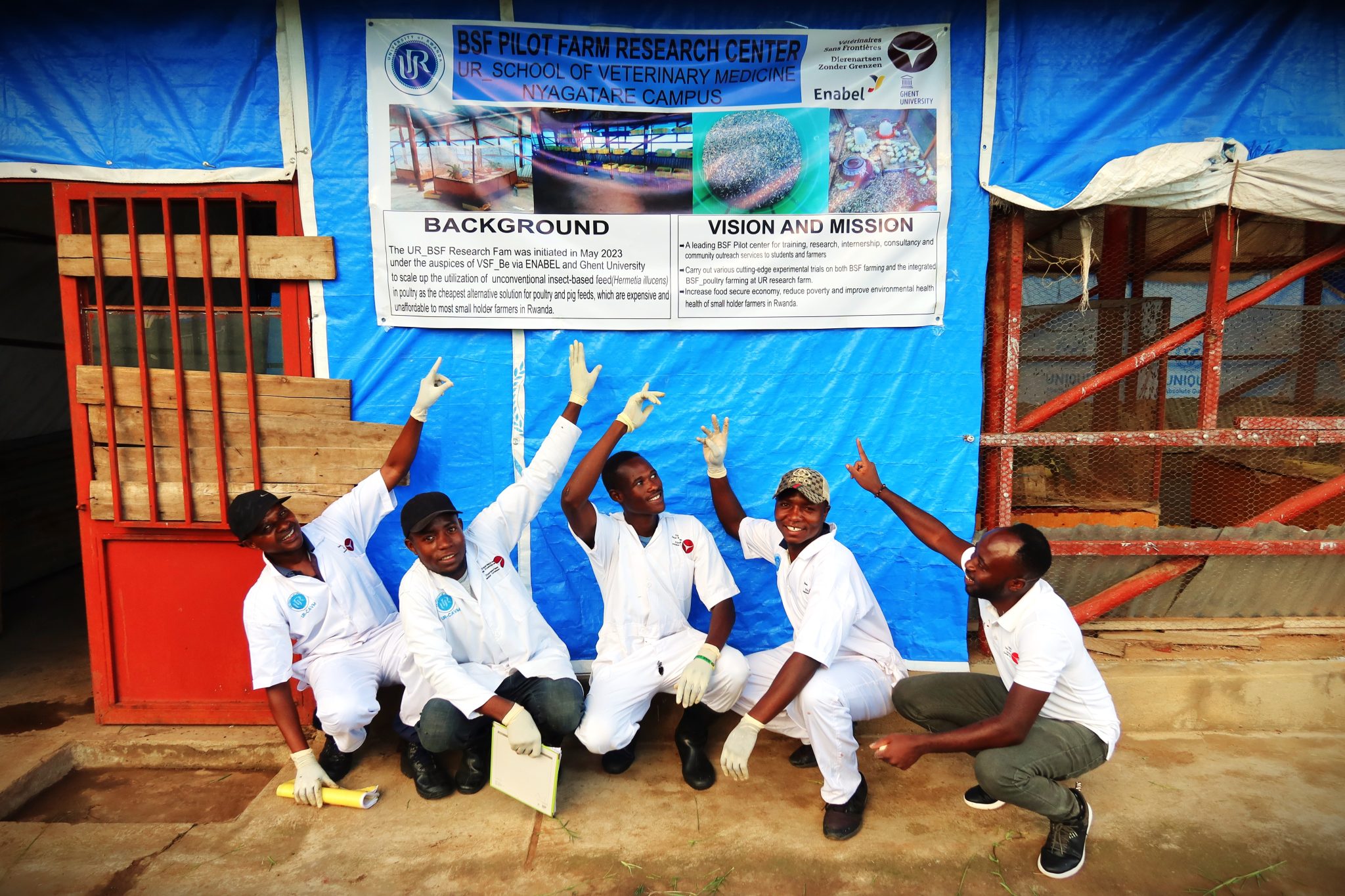
In close collaboration with the University of Rwanda and Belgian universities, we are continuing to improve the breeding of black soldier flies. A highly promising solution for feeding pigs and poultry.
Increasingly, we work in close collaboration with renowned academic institutions such as the University of Rwanda, KULeuven, HOGENT and Ghent University. Our commitment to action research enables us to test and perfect promising technologies that have the potential to improve life for the Rwandan population. The success of this approach is based on the effective participation of master’s and doctoral students. They contribute their expertise through internships and research work, receiving valuable advice from our colleagues in the field.
These immersive experiences benefit both the students and their universities, which can offer them a wide range of research subjects that lead to genuine impact. On our side, these collaborations enable us to refine our implementation strategies to ensure an even more meaningful impact in the field. Through these dynamic partnerships, we commit to continuing to offer sustainable solutions that are transforming the well-being of rural communities in Rwanda.

